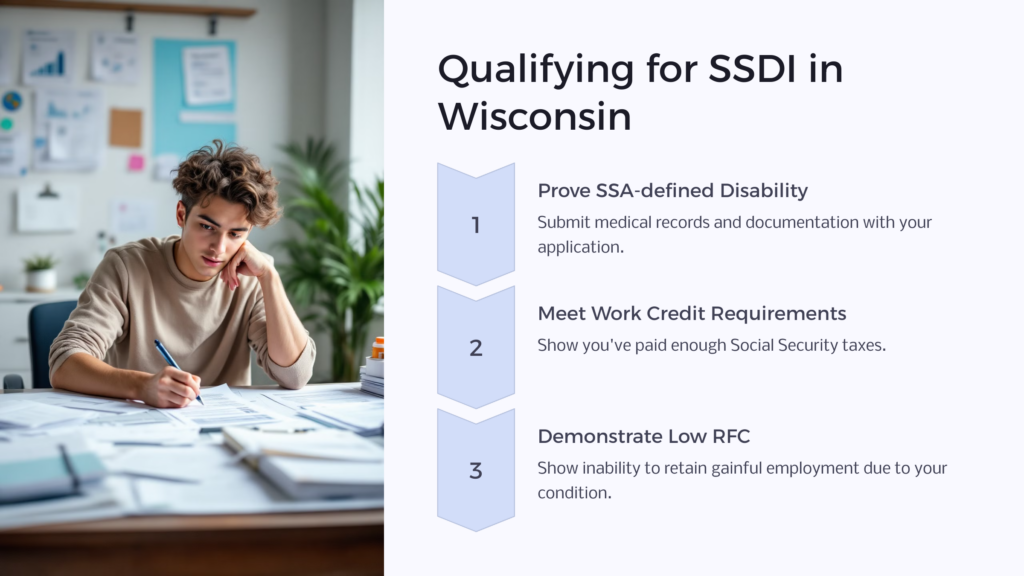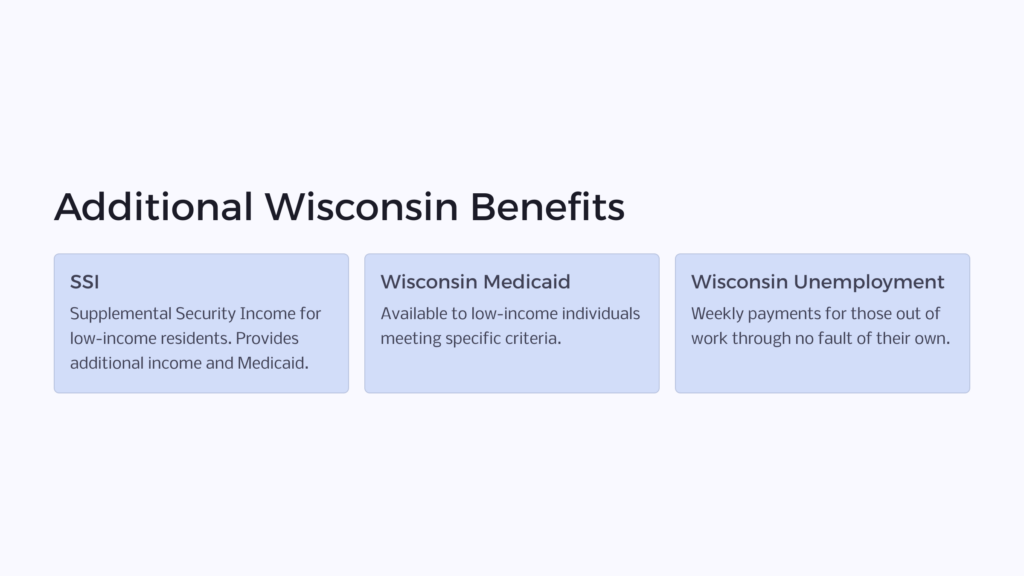Social Security Disability Insurance (SSDI) can help eligible disabled residents of Wisconsin cover housing, food, and transportation costs.
Wisconsin residents with a permanent disability necessitating long-term care, a developmental disability, or a mental illness can all benefit from Social Security Disability Benefits.
Facts About Wisconsin

Around one out of every five adults in America’s Dairyland has an SSA-approved disability, which is less than the national average of one out of every four. Mobility and cognition are the most common disability types, followed by independent living, vision, hearing, and self care.
Roughly 34% of the state’s healthcare costs go towards disabilities, equating to approximately $16 billion annually. Disabled individuals have a high threshold of expenses that are difficult to meet (housing, transportation, food) because of their difficulty retaining employment in the face of their disability.
How To Qualify for SSDI in Wisconsin

To qualify for SSDI benefits in the Badger State, you need to show the SSA that you have a disability as defined by the SSA, which has a Blue Book of hundreds of approved disabilities.
Medical records, hospital bills, and other forms of documentation should be included with your initial application to prove you are eligible for Social Security Disability. There is a list of Compassionate Allowances for diseases such as fast-moving cancers that can fast track an application, and assistive technology helps the SSA quickly identify which applications refer to such conditions.
Normally, an SSDI application might take 3-5 months to get a decision. Even if you don’t have a specific disability, you can demonstrate that you have a low Residual Functional Capacity (RFC) from conditions such as chronic back pain or difficulty concentrating. If this RFC prevents you from retaining gainful employment, you can also qualify for SSDI benefits.
An SSDI applicant must also show non-medical eligibility, or that they have the requisite number of 40 work credits. As of 2021, $1,470 in earnings through employment or self-employment equates to one work credit, and half of the required credits must have been earned in the past decade.
The work credit system is the Social Security Administration’s way of gauging whether or not you paid enough Social Security taxes (also called FICA taxes) to merit collecting SSDI. If you are younger, you may need fewer SSDI work credits.
Even after getting approved for the monetary assistance afforded by SSDI, SSDI recipients will need to undergo a periodic Continuing Disability Review (CDR) every three years – seven years for SSDI recipients whose condition is not expected to improve.
Fortunately, once someone collecting SSDI benefits has shown they have the requisite number of credits to collect SSDI, this periodic review will not involve checking their non-medical eligibility, since SSDI is offered under the assumption that they cannot work, anyway.
How To Apply for SSDI in Wisconsin

The easiest way to apply for SSDi is online at SSA.gov. You can call 1-800-492-4283 and start applying for SSDI over the phone. You can also apply in person, whether you live in Eau Claire, Madison, or Milwaukee, at one of the two dozen SSA field offices.
If you are not computer savvy or your disability prevents you from using a computer effectively, the SSA will be able to assist you with your application.
How To Appeal a Denial in Wisconsin
Around 66% of SSDI applications are denied with the initial application in Wisconsin, which is lower than the national average of 70%. If your SSDI application is not approved by the Disability Determination Service, you can request a reconsideration and furnish more evidence for your disability examiner.
If reconsideration doesn’t work, you can go before an Administrative Law Judge to present your case. The ALJ will either make a decision or return it to a different disability examiner.
The next step is to present your case before the Appeals Committee, and after that (if needed) there is the U.S. Federal Court system. However, it is unlikely your disability adjudication would go that far.
If you are working with an SSDI lawyer, you may be advised on some other options such as workers’ compensation. It’s good to meet with a Wisconsin SSDI lawyer at the outset of your application or as soon as you are no longer able to work due to a disability.
An SSDI lawyer is also relatively inexpensive since the maximum amount they can charge for their help is 25% of your SSDI back pay or $6,000 – whichever amount is lower. You typically don’t have to pay lawyer fees if your case is denied.
More Wisconsin Benefits

SSI
The SSA will also see if you can collect Supplemental Security Income (SSI) on top of your SSDI payments. With SSI, in addition to potentially giving you $700 or more in additional income, you will get Medicaid to bridge the healthcare coverage gap until Medicare kicks in after two years of SSDI.
SSI is available to low-income residents who are either blind, disabled, or over 65. Eligible recipients must have less than $2,000 ($3,000 for couples) in financial resources.
Wisconsin Medicaid
Wisconsin Medicaid is available to low-income individuals who are pregnant, have dependents under 18, have a disabled individual in the home, are disabled themselves, blind, or over the age of 65. Older adults can also take advantage of Medicare, a health insurance system with multiple parts (A, B, C, and D).
Wisconsin Unemployment
For Wisconsin residents out of work, the Wisconsin Department of Workforce Development (DWD) provides Wisconsin unemployment benefits. These weekly payments help individuals who are out of work through no fault of their own.
Wisconsin Social Security Offices
| SSA Field Office Locations in Wisconsin | ||
| Portage Office | 2875 Village Rd Suite 100 Portage, WI 53901 | (888) 875-1681 |
| Milw North Office | 6300 W Fond Du Lac Ave Milwaukee, WI 53218 | (888) 823-4323 |
| Madison Office | 6011 Odana Rd Madison, WI 53719 | (866) 770-2262 |
| Green Bay Office | 1561 Dousman St. Green Bay, WI 54303 | (888) 862-4811 |
| Fond Du Lac Office | 180 Knights Way Suite 100 Fond Du Lac, WI 54935 | (888) 717-1526 |
| Eau Claire Office | 4120 Oakwood Hills Pky Eau Claire, WI 54701 | (866) 815-2924 |
| Racine Office | 4020 Durand Ave Racine, WI 53405 | (866) 270-8629 |
| La Crosse Office | 210 7Th St S Ste 100 La Crosse, WI 54601 | (866) 770-2345 |
| Wausau Office | 352 Grand Ave Wausau, WI 54403 | (855) 269-9186 |
| Sheboygan Office | 1137 N 26Th St Sheboygan, WI 53081 | (877) 635-3549 |
| Superior Office | 4221 Tower Ave Superior, WI 54880 | (877) 628-6578 |
| Oshkosh Office | 400 City Center Ste B Oshkosh, WI 54901 | (877) 445-0834 |
| Janesville Office | 222 N Academy St Janesville, WI 53548 | (877) 850-7826 |
| Kenosha Office | 5624 6Th Ave Kenosha, WI 53140 | (866) 334-4997 |
| Milw DT Office | 310 W Wisconsin Ave Suite 260 Milwaukee, WI 53203 | (866) 467-9626 |
| Appleton Office | 607 W Northland Ave Appleton, WI 54911 | (877) 694-5495 |
| Waukesha Office | 707 N Grand Avenue First Floor Waukesha, WI 53186 | (866) 220-7885 |
| Wisconsin Rapids Office | 2213 8Th St South Wisconsin Rapids, WI 54494 | (855) 686-1465 |
| Lancaster Office | 175 W Alona Ln Lancaster, WI 53813 | (877) 405-7841 |
| Marinette Office | 2023 Lake Park Dr Marinette, WI 54143 | (888) 329-5722 |
| Manitowoc Office | 1603 Mirro Dr Manitowoc, WI 54220 | (877) 409-8430 |
| Rhinelander Office | 2023 Navajo St Rhinelander, WI 54501 | (888) 868-8185 |
| Rice Lake Office | 1703 W Knapp Street Rice Lake, WI 54868 | (888) 823-3923 |
| West Bend Office | 1145 Vern Street West Bend, WI 53090 | (888) 655-0843 |
| Milw-West Office | 5020 W North Ave Milwaukee, WI 53208 | (866) 716-8594 |
| Greenfield Office | 8455 W Layton Ave Greenfield, WI 53228 | (877) 600-2856 |
Wisconsin Hearing and Appeal Offices
Wisconsin is in Region 5 (Chicago), which services Illinois, Indiana, Michigan, Minnesota, Ohio, and Wisconsin.
| Region 5 – SSA Office of Hearing Operations in Wisconsin | ||
| SSA Hearing Office – Madison | 2501 W. Beltline Highway 3rd Floor Madison, WI 53713 | (877) 600-2854 |
| SSA Hearing Office – Milwaukee | 310 West Wisconsin Avenue Room 300W Milwaukee, WI 53203 | (866) 495-0039 |
 Benefits.com Advisors
Benefits.com Advisors
With expertise spanning local, state, and federal benefit programs, our team is dedicated to guiding individuals towards the perfect program tailored to their unique circumstances.
Rise to the top with Peak Benefits!
Join our Peak Benefits Newsletter for the latest news, resources, and offers on all things government benefits.




















